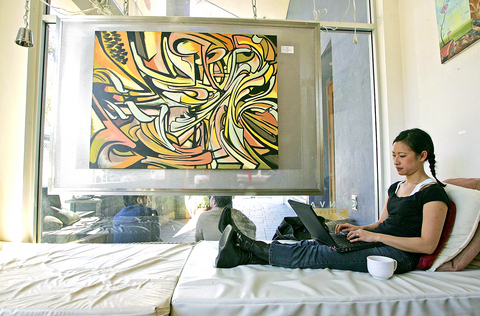The benefits and drawbacks of mobile technology have never been in any real doubt. You can be contacted at any time, you can receive texts or e-mails on a train, there are coaches on which you can receive a good Wi-Fi signal so that time isn't dead either, and most hotels have a business center or broadband in the rooms so your colleagues can get hold of you in an emergency on holiday. Frankly, once you start to regard yourself and your colleagues as individuals rather than simple economic units for the production of money, you begin to realize just how invasive technology can be. For Londoners, this month's announcement that London Underground train network is looking into how to make cellphones work on their trains starts to look like a mixed blessing.
The sheer amount of communication is now damaging the quality of the work being done. In a survey carried out by PalmOne in late 2004, more than 50 percent of respondents said that business decisions were being delayed by unanswered e-mails and that sloppy, mistake-ridden messages were damaging business relationships.
Orange [the mobile company], meanwhile, launched its Organizational Lives report this month. This freely acknowledges the drawbacks of mobile technology, the executive summary points to a blurring between work and home (after all, once you've logged on to the intranet you might as well be in the office) and says: "Mobile data will liberate those who find ways to use it selectively, while burdening those who fail to adapt their routine." The report devotes an entire section to the art of knowing when to switch off.

PHOTO: AP
Occupational psychologists are as concerned about the human cost over and above what's good or bad for business. Cary Cooper is an occupational psychologist at Lancaster University Management School, UK, and has strong feelings about constant availability (he was speaking while on holiday in the Algarve).
"We all feel now that we have to be connected. We could switch off our [cell] phones and e-mail, but we don't do it," he said.
There are a number of reasons for this, he suggests. Job insecurity is one.

PHOTO: AFP
"We are more job insecure than ever before. There are no jobs for life any more, so people feel they need to show commitment, show that they're available all the time and prepared to do work," he said.
This has coincided with the availability of virtual work and flexible arrangements, he says.
"Psychologically we're more virtual [in the workplace] than ever before. We feel we want to know what's going on, we don't want to be left out," he added.
So we check our e-mails more frequently than is strictly necessary and make sure everyone knows that we're doing it and we're available.
The consequences aren't universally positive. Diane Aitchison is a psychologist with the Criterion Partnership. She points to people with a strong sense of control who like to be seen to be available, but who end up setting a precedent by appearing to be around the whole time. They end up as the dependable one who is always called upon for extra work, and the appearance of coping can mask a highly stressed individual.
"People can be making a rod for their own back," she says. "It can reinforce some people who have work addictions and makes them feel indispensable, which on one hand is good because you feel valued so you cope in the short term, but in the longer term it can be too much."
The end result can be a breakdown or "burnout," however you wish to define that term.
"Some people like being in touch and in control of what's going on, others are happy to wait and deal with things," she says. "Some people find that a bit overwhelming and that it's difficult to switch off if they have their pager or [cell]phone."
Sheer amounts of irrelevant information have been an established problem for years.
"There are some people who find it overwhelming," says Aitchison. "We work with one organization that definitely has issues with over-use of e-mails, people have an off-site meeting and come back to 200 e-mails, and they don't want to have to go through that in the evening after a long course."
But they do.
There are less obvious negatives as well, suggests Cooper. As a psychologist he is primarily interested in the mental effects of constant availability, but the physical effects are a factor as well.
We know there are no short-term effects of holding a cellphone next to our brains for a long time at a stretch, but mid-term and long-term we just don't know yet because the technology is too young, he points out.
Then there's eye strain from sitting in front of a computer screen all day, and the effect that not moving to talk to someone but sending an e-mail instead has on your waistline -- and blood pressure, and cholesterol levels. This is before you have considered the well-established problems of personal isolation, which can of course be overcome through careful management.
The information overload stresses can also be managed to an extent. Aitchison points to the difference between receiving genuinely useful information and an inbox crammed full of e-mails with no obvious outcome or action to follow. Physical exercise can also be very effective in combating stress and putting communications in perspective.
Once upon a time, when business owners were traveling you couldn't get hold of them. You'd phone their PA and be told, "I'm sorry, he's on a train," and you'd be told, "She's driving," and that would be that. Now, thanks to cellphones, Wi-Fi hotspots, Bluetooth headsets and laptop or hand-held computers, you can send someone an e-mail or text or call their cellphone and expect an answer almost immediately regardless of the circumstances.
If they're on Wi-Fi you might even be able to tell whether they're at their desk if they have Instant Messaging, and you can message them to tell them you're e-mailing. And people do.
But this is a genie that can't be put back into the bottle. What is more achievable is the management of the genie and when it's on duty or otherwise. This could lead to yet another change in corporate culture at the moment, if you call someone and the PA says he or she is unavailable it has an air of being uncooperative. When this becomes more acceptable we'll have regained control.
Or we could just lie and say we're in a meeting, like we do now.

The CIA has a message for Chinese government officials worried about their place in Chinese President Xi Jinping’s (習近平) government: Come work with us. The agency released two Mandarin-language videos on social media on Thursday inviting disgruntled officials to contact the CIA. The recruitment videos posted on YouTube and X racked up more than 5 million views combined in their first day. The outreach comes as CIA Director John Ratcliffe has vowed to boost the agency’s use of intelligence from human sources and its focus on China, which has recently targeted US officials with its own espionage operations. The videos are “aimed at

STEADFAST FRIEND: The bills encourage increased Taiwan-US engagement and address China’s distortion of UN Resolution 2758 to isolate Taiwan internationally The Presidential Office yesterday thanked the US House of Representatives for unanimously passing two Taiwan-related bills highlighting its solid support for Taiwan’s democracy and global participation, and for deepening bilateral relations. One of the bills, the Taiwan Assurance Implementation Act, requires the US Department of State to periodically review its guidelines for engagement with Taiwan, and report to the US Congress on the guidelines and plans to lift self-imposed limitations on US-Taiwan engagement. The other bill is the Taiwan International Solidarity Act, which clarifies that UN Resolution 2758 does not address the issue of the representation of Taiwan or its people in

US Indo-Pacific Commander Admiral Samuel Paparo on Friday expressed concern over the rate at which China is diversifying its military exercises, the Financial Times (FT) reported on Saturday. “The rates of change on the depth and breadth of their exercises is the one non-linear effect that I’ve seen in the last year that wakes me up at night or keeps me up at night,” Paparo was quoted by FT as saying while attending the annual Sedona Forum at the McCain Institute in Arizona. Paparo also expressed concern over the speed with which China was expanding its military. While the US

SHIFT: Taiwan’s better-than-expected first-quarter GDP and signs of weakness in the US have driven global capital back to emerging markets, the central bank head said The central bank yesterday blamed market speculation for the steep rise in the local currency, and urged exporters and financial institutions to stay calm and stop panic sell-offs to avoid hurting their own profitability. The nation’s top monetary policymaker said that it would step in, if necessary, to maintain order and stability in the foreign exchange market. The remarks came as the NT dollar yesterday closed up NT$0.919 to NT$30.145 against the US dollar in Taipei trading, after rising as high as NT$29.59 in intraday trading. The local currency has surged 5.85 percent against the greenback over the past two sessions, central